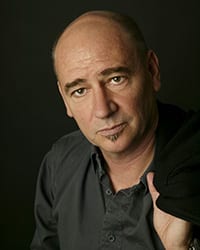Ron Elliott’s novel Burn Patterns is his first foray into the crime genre, but it’s earned him a shortlisting in the 2017 Ned Kelly Awards, Australia’s most prestigious crime writing accolade.
Set against the backdrop of suburbia, Elliot’s novel follows Iris, a psychologist and former arsonist profiler. Iris is dragged into a police case to track down a serial fire starter and murderer, but finds herself on the suspect list and questioning her own sanity.
Elliot, a WAIT alumnus, has a wealth of experience as a writer and director of film and television, and has written for much-loved shows such as Minty, Wild Kat, Ship to Shore and Home and Away. In 2001 he wrote the AFI nominated telemovie Southern Cross and currently teaches film and television at Curtin. Despite his impressive resume, Elliot says he had initial doubts about how to delve into the mind of his protagonist.
“I decided to write the central character from her point view – she was a 50-year-old psychologist – and that had all kinds of creative challenges to it,” says Elliot. “I kept thinking, ‘I’m making such a big mistake and I’m wasting my time exploring this, and I’m not going to be able to write a woman who’s crumbling’. But the book has done well, it’s so satisfying.”
Elliot says that after Burn Patterns was shortlisted for the Ned Kelly Award, a critic mentioned that it was a ‘very brave or foolish decision’ to make his central character female, but it has paid dividends. It is not unusual for authors to create a main character of the opposite sex, but a certain suspicion exists among some literary critics of male crime writers who write from a female perspective, or adopt female pen names to draw in women readers.

When asked for his thoughts on this, Elliot says while there is merit in the argument of ‘who has the right to write’, to him the emphasis should be on what makes a good story.
“To me you’re not a writer unless you can imagine being someone else. That’s the whole point,” he says. “There’s a whole vast argument, and one to be respected, about what you own culturally, and I do believe there are certain stories that are cultural secrets and I have no right to share them because they’re culturally sensitive.
“But who says that people own half the gender of the world? Yes, there are specific things that make us different, but there are many things that make us the same … I just feel like as a writer that’s my job to inhabit someone else.”
Elliot says he has ideas for stories constantly shifting around his head, but was drawn to write Burn Patterns because it gave him the freedom to research extensively (he jokes he psychoanalysed his unsuspecting family once during a weekend drive), as well as the ability to peer into the complexities of people when they’re under duress.
“I think in a time when we’re falling away from religion and centres of codes, what does it mean to be good and what happens when you fray at the edges? Good people do bad things – can they scramble back over the other side?” says Elliot. “That’s what I played with in Burn Patterns; nobody is all black or all white, and I find that intriguing.”
While his fans are calling for a sequel to his modern crime thriller, Elliot is currently working on a novel set in much earlier times – the 1890s gold rush in Australia. While he’s not metaphorically panning for gold, Elliot is also working on two feature scripts as well as a TV pilot episode. After three decades in the creative industry, it’s clear that Elliot’s desire to tell stories still burns brightly.
“Don’t stop doing it,” he urges budding writers. “Someone doesn’t have to pay you to do it. If you want to do it, don’t stop. That tenacity is what makes it work.”



